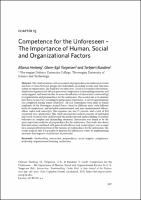Chapter 15 Competence for the Unforeseen
The Importance of Human, Social and Organizational Factors
| dc.contributor.author | Herberg, Marius | |
| dc.contributor.author | Torgersen, Glenn-Egil | |
| dc.contributor.author | Rundmo, Torbjørn | |
| dc.date.accessioned | 2018-10-08 13:09:33 | |
| dc.date.accessioned | 2020-04-01T12:20:21Z | |
| dc.date.available | 2020-04-01T12:20:21Z | |
| dc.date.issued | 2018 | |
| dc.identifier | 1001656 | |
| dc.identifier | OCN: 1076732425 | en_US |
| dc.identifier.uri | http://library.oapen.org/handle/20.500.12657/28306 | |
| dc.description.abstract | "This study examines self-assessment of preparedness for unforeseen events and how it varies between groups and individuals according to roles and functions within an organization. The study has two objectives. The first is to analyse the relationship between general self-efficacy, perceived competence in demanding situations and social support, and based on this, to assess the efficiency of interaction (samhandling) in organizations and preparedness for the unforeseen. The second aim is to examine how these factors vary according to professional experience. A survey questionnaire was completed during winter 2016/2017. All 624 respondents were male or female employees of the Norwegian Armed Forces, based in different units, with different levels of competence, and included commissioned and non-commissioned officers, officer cadets and conscripts. The response rate was 77 percent, and a total of 810 personnel were approached. This study incorporates central concepts of individual and social resources that could permit the prediction and understanding of resilient behaviors in complex and demanding situations. Interaction was found to be the most important predictor of preparedness for the unforeseen. This study also shows that interaction combined with general self-efficacy and social support can account for a considerable proportion of the variance in preparedness for the unforeseen. The results indicate that it is possible to prepare for unforeseen events by implementing measures that improve social factors in particular." | |
| dc.language | English | |
| dc.subject.classification | thema EDItEUR::J Society and Social Sciences | en_US |
| dc.subject.classification | thema EDItEUR::J Society and Social Sciences::JW Warfare and defence | en_US |
| dc.subject.classification | thema EDItEUR::J Society and Social Sciences::JW Warfare and defence::JWK Military and defence strategy | en_US |
| dc.subject.other | Samhandling | |
| dc.subject.other | interaction | |
| dc.subject.other | preparedness | |
| dc.subject.other | social support | |
| dc.subject.other | competence | |
| dc.subject.other | leadership | |
| dc.subject.other | organizational learning | |
| dc.subject.other | unforeseen | |
| dc.title | Chapter 15 Competence for the Unforeseen | |
| dc.title.alternative | The Importance of Human, Social and Organizational Factors | |
| dc.type | chapter | |
| oapen.identifier.doi | 10.23865/noasp.36.ch15 | |
| oapen.relation.isPublishedBy | bf7b42a4-6892-42e3-aaf8-8f32c8470a8b | |
| oapen.relation.isPartOfBook | 2724fb8b-60f0-4a89-9f93-98ba00ad6223 | |
| oapen.pages | 34 | |
| oapen.place.publication | Oslo | |
| oapen.identifier.ocn | 1076732425 |

